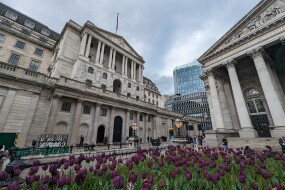The UK's major banks are now better prepared for a financial crisis and less likely to require a government bailout, the Bank of England has said. The central bank has published its second assessment of eight major banks – Barclays, HSBC, Lloyds Banking Group, Nationwide, NatWest Group, Santan
Bank Of England
The Bank of England's Monetary Policy Committee (MPC) has voted to reduce the base interest rate by 0.25 percentage points to 5%. The decision passed with a 5–4 majority vote, with four members favouring a further rate hold. Jill Mackay, savings specialist at Scottish friendly, highl
The Bank of England (BoE) has invited views from the private sector on its approach to innovation in money and payments. Building on the BoE’s work to date, the newly published discussion paper asks for responses on the next step in a wide-ranging conversation on how to deliver an ambitio
House purchases faced delays due to a technical glitch in the Bank of England's crucial CHAPS payment system.
The Bank of England (BoE) has voted to maintain interest rates at 5.25%. Despite inflation hitting the 2% target, the Monetary Policy Committee (MPC) voted 7-2 to keep rates at a 16-year high, citing the need to ensure sustained low inflation. However, a reduction as early as August was hinted at by
The Bank of England (BoE) has come under scrutiny for having spent £8.5 million on remote working kit for staff, according to official figures. The data, obtained under the Freedom of Information (FOI) Act by think thank Parliament Street revealed that Threadneedle Street has splashed out on a
Banknotes carrying a portrait of King Charles III have been issued for the first time on 5 June 2024.
The Bank of England's Monetary Policy Committee (MPC) has voted to maintain the Bank Rate at 5.25% in May, but experts say signs of an impending rate cut are clear. The MPC's forecast predicts inflation below 2% in two to three years, signalling potential cuts.
The Bank of England has agreed to a “once in a generation” overhaul of its forecasting and communications strategies following a comprehensive review led by former Federal Reserve chair Ben Bernanke. The review provides a thorough assessment of the bank’s current forecasting approa
The Bank of England Governor, Andrew Bailey, has signalled that markets are correct to anticipate more than one interest rate cut this year, expressing growing confidence that inflation is heading towards the target. In an interview with the Financial Times, Governor Bailey stated that rate cuts wer
The Bank of England (BoE) has decided to keep interest rates unchanged at 5.25%, despite a drop in inflation to 3.4% in February – the lowest level since September 2021. The positive inflation figures, released on Wednesday, came ahead of the BoE's latest interest rate decision today.
The UK may have already emerged from recession, with signs of an upturn, according to the Governor of the Bank of England Andrew Bailey. In a recent appearance before a committee of MPs, Mr Bailey indicated the possibility of interest rate cuts even before inflation reaches the 2% target. The b
The Bank of England has decided to maintain interest rates at 5.25% for the fourth consecutive meeting, emphasising the need for "more evidence" that inflation is on a sustained downward trajectory before considering rate cuts. Andrew Bailey, Governor of the Bank of England, explained that they requ
The Bank of England (BoE) has again decided to maintain the base interest rate at 5.25%. This decision came amidst Governor Andrew Bailey's assertion that considerable effort is still needed to bring inflation down to the standard 2% target. The Monetary Policy Committee (MPC) voted six to three in
The House of Lords' Economic Affairs Committee has stated that reforms are needed to improve the Bank of England's performance and accountability to parliament.










